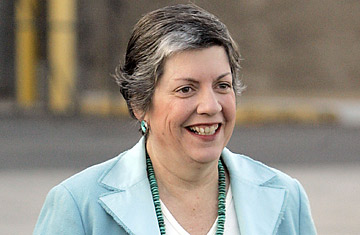
At first glance, President-elect Barack Obama's pick for his Secretary of Homeland Security looks a lot like the person currently holding the job. Governor Janet Napolitano is a former prosecutor who cares more about immigration and border security than almost anything else. But Napolitano will be very different from Secretary Michael Chertoff in two major ways. First, she is a notch to the left of Chertoff on immigration matters, having repeatedly criticized the building of a fence along the U.S.-Mexico border and having opposed state bills targeting illegal immigrants. Still, as governor of Arizona, she knows more about immigration than any other DHS fiefdom (and there are hundreds), so it's safe to assume that it will remain a top priority for the agency. And Napolitano is far from liberal on immigration: she was the first governor to call for the National Guard to protect the border at federal expense, and she has worked to penalize businesses that employ illegal immigrants.
Napolitano's other obvious distinction is that, as a governor, she can be expected to have much more sympathy for states, which have felt disrespected and excluded under a top-down approach to homeland-security issues since 9/11. "The trust between federal, state and locals is just not there," says Ray Scheppach, executive director of the National Governors Association. Governors, including Napolitano, have protested the costs of REAL ID, a 2005 law passed by Congress to upgrade the security of drivers' licenses, as well as the failure of the Federal Government to take a lead in repairing the country's immigration policies. (Napolitano declared a state of emergency in Arizona in 2005 to direct more funds to the state's border.)
And then there is the Federal Emergency Management Agency (FEMA), which has been under fire ever since Hurricane Katrina. "Fifteen years ago, if I had surveyed every state employee and said, 'What is the one federal organization that you think does a great job,' it would have been overwhelmingly FEMA," says Scheppach. "Now, if I ask what is the one organization that is a failure, they would probably point to FEMA." Scheppach, who knows Napolitano from her time as chair of his organization, expects that she will work to rebuild the trust between the Feds and the locals, which will go a long way toward fixing FEMA. "She's smart, she reaches out well, but she knows how to move things. She's pretty highly respected among governors on both sides of the aisle."
It remains unclear whether Napolitano hopes to move FEMA out of DHS. That's an option advocated by many emergency-management experts since the Katrina debacle, but the Homeland Security transition manual published this month by two think tanks, including the one led by Obama transition chief John D. Podesta, recommends shelving that decision until late 2009.
Napolitano's governorship may also be a liability, at least in the beginning. "Her one weakness is not knowing how to operate inside the Beltway," says Randall Larsen, author of Our Own Worst Enemy, a 2007 book on homeland security. "What she will need is a very savvy deputy — one who knows how to deal with Congress and the interagency community."
Above all else, congressional staffers and homeland-security experts seem to be hoping that Napolitano will be the kind of manager desperately needed at Homeland Security. The sprawling 200,000-person DHS, which has a $40 billion budget and reports to more than 80 committees, is still a source of much frustration and shame in Washington. So a governor known for getting things done may be the best hope for taming the bureaucracy. "DHS needs a strong manager, and she appears to be a tough cookie," says a Democratic Senate staffer. "I predict zero problem with her confirmation on the Hill."
Before being elected governor in 2002 and again in 2006, Napolitano was U.S. Attorney for Arizona during the Clinton Administration and then served as the elected attorney general. She and Chertoff know each other from their days as federal prosecutors and have worked together on immigration matters. And Chertoff is already signaling his support for her, which will help assure her a smooth confirmation. "Secretary Chertoff thinks very highly of Governor Napolitano," says spokesman Russ Knocke, "and considers her a personal friend."
